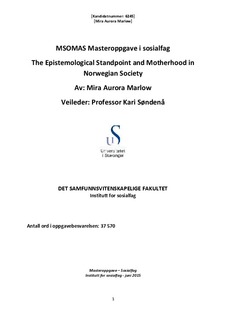| dc.contributor.author | Marlow, Mira Aurora | |
| dc.date.accessioned | 2015-09-04T12:23:49Z | |
| dc.date.available | 2015-09-04T12:23:49Z | |
| dc.date.issued | 2015-06-01 | |
| dc.identifier.uri | http://hdl.handle.net/11250/298749 | |
| dc.description | Master's thesis in Social work | nb_NO |
| dc.description.abstract | The overall theme of this master’s dissertation is the social constructivism of the concept of ‘good enough motherhood’ and what it takes to be a ‘good enough mother’ within Norwegian society. My aim was to explore social workers’ views of ‘good enough motherhood’ and whether their personal and professional history affects their evaluation of service users’ abilities to take care of their children. A further focus of this paper is to evaluate whether social workers believe that their judgement is objective or subjective.
The theoretical framework of this study is Feminist Standpoint Theory that stresses that knowledge is socially constructed, where cultural and racial aspects are visible and important. Furthermore, it aims to expose the marginalised people’s knowledge of their own life and claims that they have an important view of the power structure in their own society. Indeed, the epistemological standpoints of service users and social workers matters.
Feminist Standpoint Theory challenges the traditional objective research method, where the researcher needs to distance oneself from the study in order to get valid results and aim for value neutral observation and results. According to standpoint feminism, such a value and cultural neutral research does not exist, because the researcher’s values and reasons behind the decision to execute a particular study will always influence it to a certain level. Indeed, one cannot step outside one’s epistemological standpoint that is marked with one’s race and ethnicity, social and economic class and one’s historical and geographical location.
This dissertation was written with reference to a wide range of literature and with empirical research that was executed via individual semi-structured interviews with two social workers from the Crisis Centre in Stavanger and two social workers from the Child Welfare Service in Stavanger in Norway. The requirement for informants was to be a qualified and employed social worker and have experience of evaluating mother’s caring abilities from their work. The interview material was analysed with the help of thematic analysis, which is used to identify patterns of themes, but also highlights how the informants differ from each other.
In the chapter ‘Interpretation of the Empirical Research’ I am outlining the informants’ views of the concept of being a ‘good enough mother’ within Norwegian Society and how they interpret objectivity in the evaluation process. The informants’ epistemological standpoints with reference to the concept of being a ‘good enough mother’ are discussed. The social workers’ views in this study for ‘good enough motherhood’ were based on their subjective knowledge of motherhood and their professional knowledge of the concept. They all stated that they use both personal and professional knowledge in the evaluation process. What was considered to be objective for social workers from the Child Welfare Service in Stavanger was different to the social workers from the Crisis Centre in Stavanger. Norwegian developmental psychologist Øyvind Kvello’s guidelines and checklists were used as an objective tool in the evaluation process and report writing at the Child Welfare Service in Stavanger. In the Crisis Centre in Stavanger objectivity was attained through discussions with other colleagues about observed situations between a mother and her children. A subjective tool that all informants used was their instincts of the relationship between mother and children.
In the chapter ‘Discussion’ I am criticising the use of Kvello’s checklists in the evaluation process and challenging the universal approach to motherhood in the light of Feminist Standpoint Theory, highlighting the importance of the epistemological standpoints of service users and social workers. I am questioning whether certain risk groups should actually be classified as such because of age, race, social and economic status. The chapter is highlighting how certain mothers’ views of mothering are marginalised and others, especially white middle-class Norwegians’ are supposed to have the right kind of knowledge of motherhood. Further this chapter discusses the supposed objectivity in the evaluation process and whether it is really achievable. | nb_NO |
| dc.language.iso | eng | nb_NO |
| dc.publisher | University of Stavanger, Norway | nb_NO |
| dc.relation.ispartofseries | Masteroppgave/UIS-SV-IS/2015; | |
| dc.rights | Navngivelse 3.0 Norge | * |
| dc.rights.uri | http://creativecommons.org/licenses/by/3.0/no/ | * |
| dc.subject | sosialt arbeid | nb_NO |
| dc.subject | social work | nb_NO |
| dc.subject | feminist standpoint theory | nb_NO |
| dc.subject | epistemological standpoint | nb_NO |
| dc.subject | motherhood | nb_NO |
| dc.title | The epistemological standpoint and motherhood in Norwegian society | nb_NO |
| dc.title.alternative | Den epistemologiske standpunkt og morskap i norske samfunnet | nb_NO |
| dc.type | Master thesis | nb_NO |
| dc.subject.nsi | VDP::Social science: 200::Social work: 360 | nb_NO |

